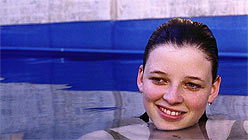The provocative Argentine director Lucrecia Martel, a rising luminary in world cinema, makes a hit-and-run visit this week to Yerba Buena Center For the Arts with two of her three fascinating feature films. Inspired by her country’s moral lethargy, class divide and frustrated women, La Ciénaga and The Headless Woman nonetheless have plenty to say to American audiences.
Martel’s films could be described as domestic mysteries, fraught with foreboding and crammed with casually yet carefully placed clues. We’re dropped into the middle of a household or location, and have to glean or deduce how the characters are related, and what they want or, more importantly, what they need. There’s no crime, per se, other than the sundry ways in which Martel’s people avoid taking responsibility for their behavior. I should add that the filmmaker has little interest in destinations or (re)solutions — she recognizes the messy life-goes-on nature of reality more than the artificial tropes of storytelling.
Her remarkable 2001 debut, La Ciénaga (The Swamp), screening Tuesday, July 14, begins with a woozy array of indolent adults drunkenly zoned out next to an uninviting swimming pool. They’re oblivious to the children running around with shotguns in the hills, or flirting with disaster inside the house. The parents’ abdication of responsibility (symbolizing the government’s) is most horrifyingly apparent, however, at meals or other times when they’re in the same room with their kids — physically present but indifferent, and blind to the effects their casual insults and thoughtless gossip have on their offspring.
The dissolute families in La Ciénaga are well off, but the movie is crammed with moments where we anticipate someone will come to harm. The hazards include guns, pools, alcohol, cars, dogs and ladders, but the main threat is the parental figures’ inertia and entropy. This may remind you of the studied pretentiousness of The Ice Storm, Ang Lee’s depiction of selfish absentee parents, but there’s a big difference: Martel fills the screen with so much color and vitality that we find ourselves gradually subsumed into the home life, and strangely complicit.
Wine helps the mother sleepwalk through her unsatisfying existence, while the protagonist of Martel’s newest work, The Headless Woman (Wed., July 15, followed by a conversation between Martel and local critic B. Ruby Rich), enters into a glazed-eyed stupor after running something or someone over on a deserted road. It’s daylight but Veronica drives on without looking back, and over the next few days goes through the motions of her marriage and dental practice. (Martel underexposes many of these scenes or silhouettes her “heroine,” bathing her and us in the half-darkness of Veronica’s mental state.) When Veronica finally acknowledges what she thinks happened, and blurts it out to her husband, he’s quick to dissuade her and smooth her tracks.


